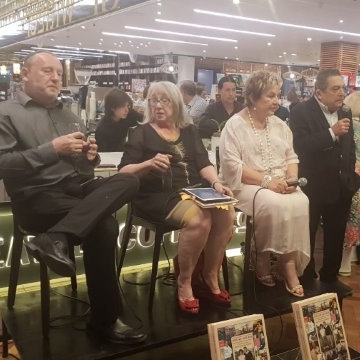
News

Kirsh family’s African story adds to SA Jewish legacy
STEVEN GRUZD
She was born a Bacher, one of five siblings and sister of cricket great Ali, and she married the founder of talk radio station 702, Issie Kirsh. These families have both produced many remarkable South Africans in all walks of life. But Kirsh also wanted to universalise her story, and set it against the remarkable tale of South African Jewry.
Kirsh and her co-author, David Saks, spoke to renowned radio personality Jenny Crwys-Williams at the launch of African Outliers: The Story of the Bacher and Kirsh Families, at Exclusive Books in Hyde Park last Wednesday evening. Ali Bacher introduced the evening.
“I’m sure our story will resonate with many of the people here tonight,” said Kirsh at the packed launch. “It’s important to know about our roots, and celebrate the remarkable contribution Jews have made to this wonderful country.”
Saks, historian and associate director of the South African Jewish Board of Deputies, described how South African Jewry is largely the remnant of the once-vibrant Litvak culture that was decimated in the Holocaust. Vilna (Vilnius, today’s capital of Lithuania) was known as “the Jerusalem of Europe”, a centre for devout Jewish scholarship. Today, particularly pious yeshivot are still known as “Lithuanian”, wherever in the world they may be.
The bulk of South African Jews are Litvaks, tracing their lineage to Lithuania and surrounding areas. From 1880 to 1929, when Jewish emigration was severely curtailed, 50 000 souls sought a better life away from Eastern Europe’s anti-Semitism, oppression and poverty in the land of diamonds and gold at the southern tip of Africa.
The first Lithuanian Jew came to South Africa in 1816. Early pioneers like Sammy Marks arrived in the 1860s, but the big wave was in the 50 years from 1880. They transformed South African Jewry, which was comprised mainly of comparatively assimilated English and German Jews at the time. Saks said: “The existing Jewish community found the Litvaks barbaric and uncouth, while the Litvaks basically thought the others were goyim. But they fused their traditions, and energised this special community. South African Jews who have emigrated to Australia have similarly revived Jewish communal life there.”
Saks also spoke of the phenomenon of many young Johannesburg Jews becoming more religious than their parents, bucking international trends. The community has also been among the world’s staunchest Zionists.
Kirsh visited her ancestors’ family home in Rakishok, Lithuania, in 2013, a place she thought she’d never want to go due to the destruction of Jewry in World War II. “I was very sad. There was really no semblance of the once-powerful Jewish scholarship and presence in Lithuania … but I’m pleased I went, to come to grips with this amazing story.”
Saks said he was haunted by a photograph of a mass grave of about 8 000 Jews murdered by the Nazis in Siauliai/Shavel. “It’s likely my own great-grandparents may be among them. You don’t get over something like this.”
Kirsh’s family rose from humble beginnings in a tin shanty house on a railway line, selling cheap blankets in a concession store to mine workers in Johannesburg. Mushe spoke about meeting her future husband, Issie Kirsh, on the train to Habonim Machaneh. “This man changed my life,” she said.
Crwys-Williams asked whether the hardest part of writing the book over three years was knowing what to leave out. Kirsh said: “I so enjoyed researching, reading, recording. I loved every minute.”
Saks said the story kept growing. “It has a big cast of characters, and it was therefore important to get the structure right.”
William Kirsh, one of Mushe and Issie’s sons, said at the launch: “I’m so happy and proud of what my mom has accomplished. Every person here wants to leave some legacy, and this book will resonate for all of them.”




